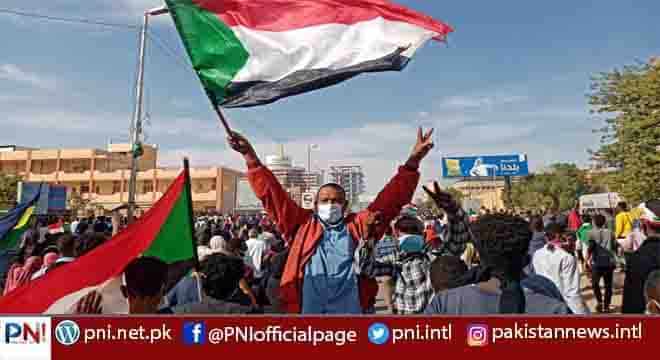Khartoum, July 5 (AFP/APP): Sudanese strongman General Abdel Fattah al-Burhan has announced the army will make way for a civilian government in a bid to end protests that have rocked the country since October’s coup.
Burhan’s announcement late Monday came amid a fresh wave of pro-democracy protests.
Recent rallies have been brutally suppressed, with at least 114 protesters killed since October, according to pro-democracy medics.
Here are the key developments since the military takeover.
– Army ousts transitional government –
On October 25, 2021, the army arrests civilian members of the power-sharing transitional government installed after the 2019 ouster of longtime autocrat Omar al-Bashir. Those arrested include Prime Minister Abdalla Hamdok.
Hamdok’s office urges protesters to take to the streets. Security forces fire at demonstrators, killing several and wounding dozens.
The coup, which is led by Burhan, sparks an immediate international backlash, with calls to free Hamdok.
The United States says it is suspending $700 million in aid to Sudan.
Protesters, including key figures who were behind the popular uprising that led to Bashir’s fall, remain on the streets for days to demonstrate against the return to military rule.
Shops are shuttered as part of a campaign of civil disobedience.
Hamdok is put under house arrest. The security forces use tear gas to try to disperse protesters and make sweeping arrests.
The African Union suspends Sudan, and the World Bank freezes vital aid to the poverty-stricken country, which is already in the throes of an economic crisis.
The UN Security Council calls on Sudan’s military rulers to restore the civilian-led government.
On November 4, as international pressure builds, four civilian ministers are released.
A week later Burhan, Sudan’s de facto leader since Bashir’s ouster, forms a new ruling council.
He maintains his position as chief, while military figures and ex-rebel leaders keep their posts. The main bloc demanding a transfer to civilian rule is excluded.
At least five people are killed on November 13 by security forces seeking to stem anti-coup protests.
Four days later, 15 more protesters are shot dead by security forces in the worst violence since the coup.
On November 21, Burhan and Hamdok sign a 14-point deal to restore the transition to civilian rule, with elections slated for 2023.
Hamdok is reinstated as premier, and the deal says all political detainees will be freed. Several civilian leaders detained since the coup are released.
But many people reject the pact and take to the streets again.
On December 19 — the third anniversary of the anti-Bashir uprising — two men are shot dead and the UN says it received claims that 13 women and girls were raped during the crackdown on anti-coup protests.
More protests erupt on December 30.
Hamdok resigns on January 2, 2022, after three more protesters are killed, saying Sudan “is crossing a dangerous turning point that threatens its whole survival”.
The US and European Union warn the generals not to name their own prime minister, and thousands again take to the streets.
Three protesters are killed on January 6.
On January 13, the UN says it will launch talks to help end the crisis, but the main civilian groups boycott the process.
Police say protesters trying to march on the presidential palace stabbed to death a top officer. At least one demonstrator is shot dead by security forces.
As Sudan’s economy nosedives, tens of thousands of protesters rally anew on June 30 to demand an end to military rule.
At least nine protesters are killed, including a 15-year-old.
The UN’s human rights chief Michelle Bachelet calls for an investigation into their deaths.
Protesters remain on the streets.
In a surprise announcement, Burhan on July 4 says the army will no longer participate in talks facilitated by the UN and regional blocs, in order “to make room for political and revolutionary forces and other national factions” to form a civilian government.
The announcement appears to be a major concession by the military, but protesters remain on the streets, saying they do not trust Burhan to give up power.
On July 5, Sudan’s main civilian bloc, the Forces for Freedom and Change, rejects the proposal as a “tactical retreat” and a “ruse”, urging continued street pressure.
Follow the PNI Facebook page for the latest news and updates.








